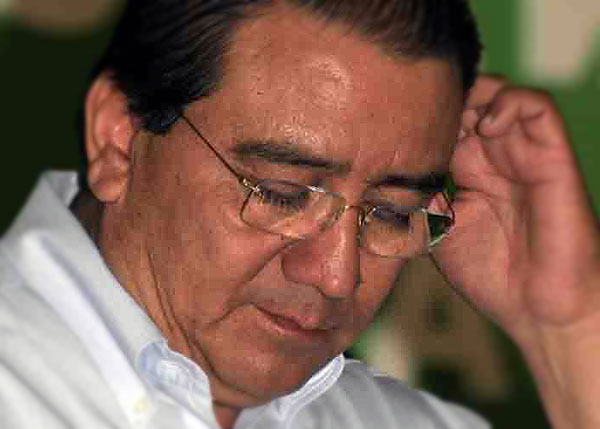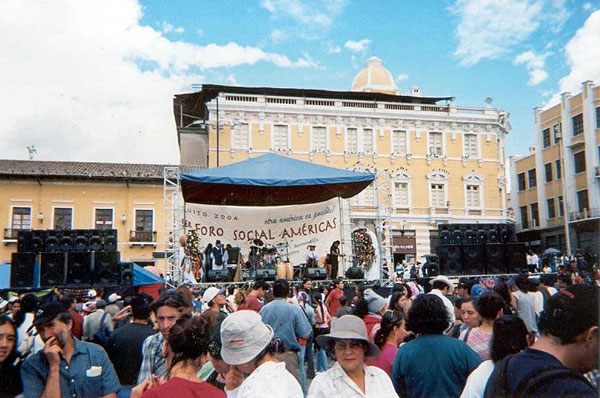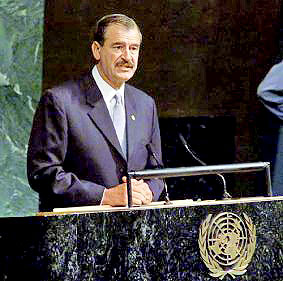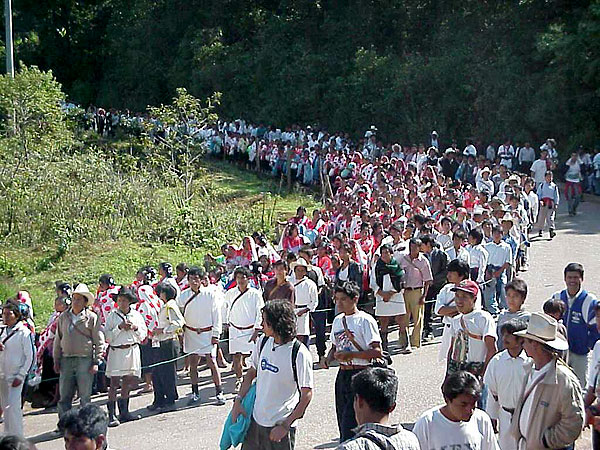SIPAZ Activities (April – June 2004)
30/06/2004
ANALYSIS: Elections in Chiapas, who won?
30/12/2004“It is not that the conflict that exists in Chiapas has been resolved, or that it has lost its importance. It is that peace will not be built solely on the basis of national efforts when its causes are increasingly more global and allude to the urgency of a profound change in the dominant economic and political system.”
(Samuel Ruiz Garcia, bishop emeritus of San Cristobal de Las Casas, Chiapas, “A new hour of grace”, January 25, 2004)
I
t is difficult to write about any Social Forum, and, in this sense, the first Social Forum of the Americas (FSA) that took place in Quito, Ecuador this past July 25-30 is no exception. From the day prior to and beginning with the registration, one might ask if the participants believed in the theory of chaos. Around 10,000 participants from 44 countries, primarily from the American continent, came together on this occasion.
Osvaldo León, director of the Latin American Information Agency (ALAI) explains: “This first FSA joins in the trend that came from the World Social Forum (FSM) to articulate the diversity of social sectors and forces that speak in opposition to neoliberal policies, and with this diversity, bring together alternative proposals with a sense of humanity. The FSM was created at the end of January 2001 in a celebrated event in the Brazilian city of Porto Alegre as an antithesis to the Global Economic Forum (FEM) that annually occurs in Davos, Switzerland between the financial and political leaders of rich countries.” In addition to the World Social Forums, regional and thematic Forums have also been organized.
In Quito, each participant will have had a different experience. In fact, participation in the FSA must have been a nightmare for the indecisive, as there were hundreds of different events, including conferences, panels, tables of dialogue, testimonials, and meetings – many of which will occured simultaneously.
Under the central idea that “another world is possible,” the range of themes embraced was very broad: free trade agreements, militarization, human rights, foreign debt, sustainable development, food security, etc. Not all had a gloomy analysis of reality so black as to discourage activists. Some experiences of resistance to neoliberalism and its military corollary at the national, regional and global level were, in contrast, like rays of light: the more well known processes (such as Mexican neo-Zapatismo, the landless in Brazil, or Argentinean protestors) and others not so well known (such as the indigenous movements of Bolivia and Ecuador). It is not said in vain of Latin America that it is the “continent of hope.”
The FSA could be compared to a large buffet of current leftist thought, a rainbow that runs from the most orthodox (the two-step strategy: first, take power, and then, change the world) to the most anti-systemic in the line of the anarchist tradition. After several days, the dynamic began to shift towards making one think of the processes of consensus-building in the indigenous communities of Chiapas: all had the possibility of giving their point of view, which can be repetitive, but at the same time, that participation continues to be important in order to arrive at real agreements – not only in the sense of recognizing problems, but also directed towards developing concrete actions.
In fact, in a July article titled “The World Social Forum in the Crossroads,” Immanuel Wallerstein, departmental professor-researcher at Yale University in the United States, placed the main challenge of the process at this same level: “That which will determine the capacity of the open space to serve the objective of transforming the world in a more democratic and egalitarian sense, is the manner in which the FSM can develop mechanisms to reconcile an open space with a real and concrete political activity.”
It is in this way that this “other possible world” will be built, that differing opinions and criticisms will be expressed in these forums, in particular by their limited practical effects beyond the scope and diversity of these same encounters. Not all of these criticisms come from outside, but also from within. Immanuel Wallerstein in the aforementioned article summarizes the majority of criticisms in these terms: “The criticisms (…) are multiple: the FSM says that another world is possible; it should be said that socialism is the objective. The FSM is an open forum; therefore, it is not pure chatter. It does not involve action; therefore, it is inherently ineffective. It accepts money from non-governmental foundations and organizations; therefore, it has sold out. It is not permitted to participate in political parties; by which it excludes key groups. It does not permit groups involved in violence to participate; but violence is legitimate for oppressed groups that have no other alternative. All the initial assertions regarding the FSM are correct. But the inferences, presented after the semicolons, are rejected by the FSM.”
It was largely in the Lacandon jungle in Chiapas in 1996 that this global movement of resistance originated, which today is expressed in the motto of the World Social Forum: “Another world is possible.” Neo-Zapatismo also suggests some ways in which to go about transcending the discussions that occur within these Forums from this invitation to utopian construction: “a world in which all other worlds fit,” a theme that highlights the Mexican group “Youth in Alternative Resistance” (see the full report “Five dreams of Zapatismo, five dreams for the resistance”)
A Chilean theologian asked in one of the spaces: “I would like to know if everyone who wants to change the world is prepared to change themselves?” This question recalls one of Gandhi’s phrases. “We have to be the change that we want to see in the world.” The search for congruence in the construction of real change continues to be a challenge within and without the social Forums, each one of which we believe is necessary.
José Astudillo, vice-president of SIPAZ, of Ecuador, also recounted after the Forum: “To pass from charity to solidarity, from paternalism to mutual responsibility, to transform unjust relations between the haves and the have-nots, was a very important reflection. Many organizations from the United States and Europe are questioning the manner of cooperation of international bodies. “The help,” “the relief work,” in the majority of cases are conditions designed to further exploit poor countries. Cooperation should be a tool in defense of Life, there are no benefactors or beneficiaries but an alliance.” When participating in the dream of constructing “another possible world,” all of us are in the same boat.
For more information, consult: http://alainet.org or www.forosocialamericas.org



